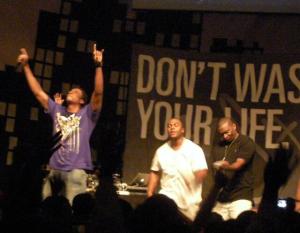Apologetics is central to how Christians share, support, and defend faith.
“Christian Apologetics is the field dedicated to explaining and defending the truths of the Christian faith, addressing both the reasons why believers hold their convictions and the questions or objections posed by skeptics. The term “apologetics” comes from the Greek word apologia, meaning a “defense” or “answer.” This concept can be seen in 1 Peter 3:15: “But in your hearts sanctify Christ as Lord. Always be prepared to give a defense to everyone who asks you the reason for the hope that is in you…” The ultimate aim is to remove intellectual stumbling blocks and invite people into deeper understanding, rather than to “win arguments” merely for the sake of victory” (Christian Apologetics, Bible Hub, 2025).
“But in your hearts revere Christ as Lord. Always be prepared to give an answer to everyone who asks you to give the reason for the hope that you have. But do this with gentleness and respect, keeping a clear conscience, so that those who speak maliciously against your good behavior in Christ may be ashamed of their slander” (Peter 3:15-16, NKJV).

This scripture highlights the importance of apologetics, which involves the defense of one’s faith. When coupled with John 15:16, the depth of the apologetics is heightened.
“You did not choose me, but I chose you and appointed you so that you might go and bear fruit—fruit that will last—and so that whatever you ask in my name the Father will give you” (John 15:16, NLT).
Add to this the call for discipleship as stated in Matthew 28:19-20.
“Therefore go and make disciples of all nations, baptizing them in the name of the Father and of the Son and of the Holy Spirit, 20 and teaching them to obey everything I have commanded you. And surely I am with you always, to the very end of the age” (Matthew 28:19-20, NIV).
Testimony is central to this understanding of the apologetics. Some biblical verses point to this fact.
“And this is the testimony: God has given us eternal life, and this life is in his Son” (1 John 5:11, NKJV).
“So do not be ashamed of the testimony about our Lord or of me his prisoner. Rather, join with me in suffering for the gospel, by the power of God” (2 Timothy 1:8, NKJV).
“Let the redeemed of the Lord tell their story—those he redeemed from the hand of the foe” (Psalm 107:2, NKJV).
“But in your hearts revere Christ as Lord. Always be prepared to give an answer to everyone who asks you to give the reason for the hope that you have” (1 Peter 3:15, NJKV).
Evangelism precludes the sharing of the Word. In Christian Hip Hop, this is front and center. Following scripture, Christian Hip Hop artists are providing evangelism through their music.
“He called you to this through our gospel, that you might share in the glory of our Lord Jesus Christ” (2 Thessalonians 2:14, NIV).
“For I am not ashamed of the gospel, because it is the power of God that brings salvation to everyone who believes: first to the Jew, then to the Gentile” (Romans 1:16, NIV).
“Consequently, faith comes from hearing the message, and the message is heard through the word about Christ” (Romans 10:17, NIV).
“The Spirit of the Lord is on me, because he has anointed me to proclaim good news to the poor. He has sent me to proclaim freedom for the prisoners and recovery of sight for the blind, to set the oppressed free” (Luke 4:18, NIV).
Bible references point to the command to proclaim the gospel and defend the faith.
“The command to defend belief in God, His Word, and the redemptive work of Christ springs from Scripture itself. For instance, Philippians 1:7 speaks of believers taking part in “the defense and confirmation of the gospel.” The emphasis on biblical truth rests on the conviction that all Scripture is God-breathed (2 Timothy 3:16) and authoritative” (Christian Apologetics, Bible Hub, 2025).
Further, the consistency with the truth of the Word that the apologetics provides unfolds another level of discipline.
“Scripture portrays truth as knowable (John 8:32). Jesus Himself embodies truth (John 14:6), meaning that defending Christian truths reflects a desire to point others to the One who is the ultimate source of truth” (Christian Apologetics, Bible Hub, 2025).
The multiple versions of apologetics (biblical, historic, philosophical, scientific, manuscript evidence and text reliability, and experiential) outline the depth and breadth of this discipline. The version most are familiar with is biblical apologetics, which focuses on the reliability, truth, and evidence of scriptural truth to solidify faith (Christian Apologetics, Bible Hub, 2025).

The Foundation of Christian Hip Hop as Apologetics
The core foundations of Christian Hip Hop (personal testimony, evangelism, discipleship) articulate and follow an apologetic discipline. Each of these core elements of Christian Hip Hop is codified in the apologetics, primarily biblical apologetics, with some leaning toward experiential apologetics.
Christian Hip Hop artists use their work (rap, beat, sonic profile, and video) to frame a contemporary apologetic to reach as wide an audience as possible. This is the rationale for the core elements of Christian Hip Hop: to express gospel truth, make disciples, and defend faith through testimony and evangelism. Therefore, Christian Hip Hop is a narrative of apologetics.
Samples from different Christian Hip Hop artists to illustrate how these core elements of Christian Hip Hop function as apologetics serve to confirm the importance, relevance, and contemporary cultural necessity of Christian Hip Hop.
Testimony
Gospel Gangzter, “Testimony”
This track holds the title in the discipline. The clarity of the lyrics outlines the personal testimony, which is intended to provide the listener with an opportunity to see how they relate to this testimony to find their own and learn how it aligns with gospel truth.
Evangelism
Bobby Bendito, “My Brotherz” ft. C.O.G, Mr.Johnson (Official Music Video)
This is a large area with multiple examples throughout the canon of Christian Hip Hop. The artist Bobby Bendito eloquently expresses an evangelistic tone and position with such ease and poise that any listener can find a connection.
Discipleship
HOG MOB/Dontae, “1 Hunid”
This area is a bit more challenging for some artists. Dontae uses his incarceration history to unpack this discipline and share apologetically the gospel with inmates. The reality of the video is riveting and underscores the credit that Dontae provides in establishing discipleship.
Scripture/Biblical-centered lyrics
ISAIAH 53:5 [Official Video]
The artist uses a strong biblical reference to claim this area.
“But he was wounded for our transgressions, he was bruised for our iniquities: the chastisement of our peace was upon him; and with his stripes we are healed” (Isaiah 53:5, NKJV).
This scripture is interwoven throughout the track directly and in metaphorical meaning. The artist uses this scripture to collect all the other core elements of Christian Hip Hop. The track works as a summary of Christian Hip Hop apologetics in title, lyrics, and visuals.

It’s All In The Presentation
Christian Hip Hop, Gospel Rap, and Faith Rap are terms that relate to the same overarching genre of music. As a theomusicologist, the use of Christian Hip Hop as a large genre includes these other subgenres. I have written elsewhere about this relationship. The point is the expression of the four core elements of Christian Hip Hop: testimony, evangelism, discipleship, and scripture/biblical-centered lyrics.
These elements help contextualize this genre and serve as the apologetic tools for Christian rappers. Utilizing the large genre of Hip Hop, Christian rappers explore an apologetic discourse with ease and direct communication to a large audience. The popularity of Hip Hop in everyday life allows for Christian rappers to apologetically present their work through the common engagement with this genre. In doing so, Christian rappers can share the gospel and their personal development as faith-based artists. This underscores a practical relationship that Christian rappers can employ with audiences. Returning to the core elements of Christian Hip Hop gives a foundation for the artists and pushes this genre forward. Borrowing elements from the large global Hip Hop genre, Christian rappers remain current with their works, therefore giving the opportunity to gain audience attention rather than lose visibility due to their works being outdated.
Contemporary theomusicology can provide more critical attention to Christian Hip Hop. Listeners and fans can share the apologetic intent of Christian Hip Hop. Christian Hip Hop artists can continue to express the gospel through their works, framing projects on the core elements of Christian Hip Hop. This collaboration will advance the genre, provide the opportunity to make disciples, and house a critical apologetic discourse through Christian Hip Hop.














